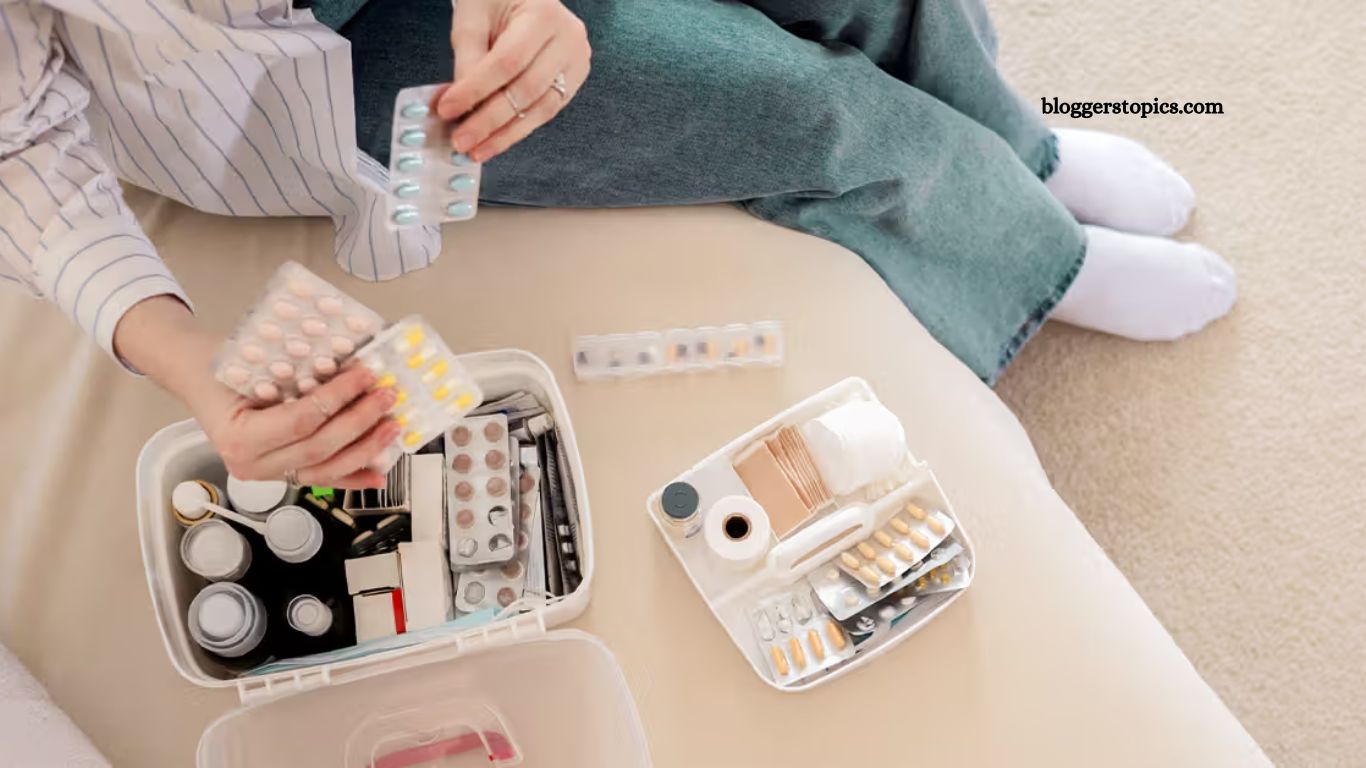Viral infections, including the common cold, flu, and gastroenteritis, are a frequent part of life. Adults typically experience two to three colds each year, while children may face even more. These illnesses, though usually mild, can disrupt daily routines and leave you feeling unwell for several days.
Having a dedicated sick day starter pack at home a medium-sized box or basket stocked with over-the-counter (OTC) medications, herbal remedies, and essential symptom-relief items can help you respond quickly and manage discomfort effectively. By preparing in advance, you can reduce stress and begin symptom relief at the first sign of illness.
Read More: The Health Impact of EV Charging Stations: What You Need to Know
A Note on Home Remedies for Viral Infections
Viral infections, such as the common cold, gastroenteritis, COVID-19, and influenza, can produce a variety of symptoms, including:
- Sore throat
- Runny nose
- Nasal congestion
- Headache
- Muscle aches
- Chills
- Fever
- Diarrhea
- Constipation
- Abdominal pain
- Heartburn
While over-the-counter (OTC) medications and home remedies can help alleviate discomfort, it’s important to understand that they do not cure the underlying infection. In most cases, viral illnesses resolve on their own with time and supportive care. Antibiotics, which target bacterial infections, are not effective against viruses and should not be used to manage these symptoms.
Over-the-Counter (OTC) Medications
A variety of over-the-counter (OTC) medications are available to help manage common ear, nose, throat, and gastrointestinal symptoms. With so many options on the market, it can feel overwhelming, but your sick day starter pack doesn’t need to include every product. Focus on OTC items that address the symptoms you are most likely to experience.
Some essential OTC medications to consider include:
- Nasal decongestants for sinus relief
- Throat lozenges for sore throats
- Pain relievers such as acetaminophen and ibuprofen
- Antihistamines such as diphenhydramine (Benadryl) and chlorphenamine (Chlor-Trimeton)
- Antidiarrheals such as bismuth subsalicylate (Pepto-Bismol) and loperamide (Imodium)
- Laxatives such as psyllium (Metamucil, Konsyl) and polyethylene glycol (MiraLAX) for constipation
- Hydration solutions such as Pedialyte
- Gastrointestinal symptom relievers, including antacids, H2 blockers, and proton pump inhibitors (PPIs)
- Chest soothing rubs such as Vicks VapoRub
A digital thermometer is also essential to monitor body temperature for signs of fever. Fever thresholds include:
- Adults and children: 100.4°F (38°C) oral
- Infants under 1 year: 99°F (37.2°C) armpit or 100.4°F (38°C) rectal
Additionally, nasal irrigation pumps can be a useful tool for relieving nasal congestion and promoting comfort.
Generic vs. Brand-Name Drugs
Many over-the-counter (OTC) medications are available as generic versions in addition to brand-name products. Generic drugs are typically more affordable while being equally effective and safe.
It’s important to note that the appearance of generic medications such as color, size, or shape may differ from their brand-name counterparts. Despite these differences, the active ingredients and therapeutic effects remain the same.
If you’re unsure which product to choose or need assistance locating a specific OTC medication, a pharmacist can provide guidance and help ensure you select the right option for your symptoms.
Pantry Items to Keep in Stock
Having a selection of common pantry items on hand can make it easier to stay hydrated and nourished while recovering from illness. Maintaining proper fluid intake and ensuring you receive essential vitamins, minerals, and nutrients is especially important when experiencing symptoms such as diarrhea.
Some helpful pantry staples include:
- Broth cubes (chicken, beef, bone, or vegetable)
- Canned soups, particularly chicken noodle soup
- Herbal teas such as lemon, ginger, chamomile, or peppermint
- Electrolyte powders for hydration
- Ginger ale cans
- Honey, which can soothe a sore throat when added to hot tea (note: do not give honey to infants under 1 year)
Regularly check expiration dates to ensure all items are safe and effective to consume.
Additional Items to Prepare for Sick Days
Beyond over-the-counter medications, having certain household items on hand can help reduce the risk of spreading a virus to others. Essential supplies include:
- Alcohol-based hand sanitizer
- Antibacterial hand soap
- Face masks
- Cleaning supplies, such as disinfectant sprays and wipes
- Tissues and a small, portable bin for disposal
Comfort is also an important part of recovery. Keep a set of warm pajamas and cozy socks in an accessible location so you can rest comfortably while recuperating.
When to Contact a Doctor
Most viral infections, including the common cold, resolve on their own within one to two weeks. However, the United Kingdom’s National Health Service (NHS) advises consulting a primary care physician (PCP) if you experience any of the following:
- A fever that persists for three days or more
- Symptoms that worsen or fail to improve after ten days
- Chest pain, chills, or shortness of breath
- An underlying health condition, such as diabetes or cancer
A PCP can provide guidance and recommend targeted treatments to help manage symptoms and support a safe recovery.
What You Can Do Today
If you don’t yet have a sick day starter pack—or if your OTC products are scattered throughout the home—now is a great time to get organized and prepare for the next illness.
- Stay vaccinated: Keep up-to-date with flu shots to help reduce your risk of infection and the severity of symptoms if you do get sick.
- Choose a container: Use a shoe-sized basket, box, or other storage container for your OTC medications and essential items such as a thermometer, hand sanitizer, and face masks. Keep it in an accessible location but out of reach of children.
- Check expiration dates: Review labels on all OTC medications, hydration solutions, pantry items, and safety equipment to ensure they are safe to use.
- Consult your doctor if needed: If you have a chronic condition or take prescription medications, speak with your healthcare provider about any OTC products to avoid to prevent complications.
Frequently Asked Questions (FAQs)
What is a sick day starter pack?
A sick day starter pack is a pre-prepared collection of medications, pantry items, and essential supplies designed to help you manage common viral infections, like colds, flu, or gastroenteritis, at home.
Do OTC medications cure viral infections?
No. Over-the-counter (OTC) medications can relieve symptoms such as fever, congestion, or diarrhea, but they do not cure the underlying viral infection. Most viral illnesses resolve on their own with time and supportive care.
Should I buy brand-name or generic medications?
Generic medications are just as safe and effective as brand-name products, and they are typically more affordable. Appearance may differ, but the active ingredients remain the same.
Can children use honey for a sore throat?
Honey can soothe a sore throat in older children and adults, but it should never be given to infants under 1 year due to the risk of botulism.
When should I contact a doctor?
Consult a healthcare professional if you have a fever lasting more than three days, worsening symptoms, chest pain, shortness of breath, or if you have an underlying health condition such as diabetes or cancer.
How should I store my sick day starter pack?
Use a container or box that’s easily accessible but out of reach of children. Keep it organized and regularly check expiration dates on medications, food items, and supplies.
Are flu shots necessary if I already have a starter pack?
Yes. A sick day starter pack helps manage symptoms, but vaccinations are the best way to prevent infections and reduce the severity of illnesses like the flu.
Conclusion
Being prepared for a sick day can make a significant difference in managing symptoms and maintaining comfort while recovering from viral infections. By assembling a starter pack with essential OTC medications, pantry items, hygiene supplies, and comfort items, you can respond quickly and reduce stress when illness strikes. Remember, most viral infections resolve on their own, but knowing when to seek medical advice is crucial, especially if symptoms persist or worsen. Regularly check expiration dates, stay up-to-date on vaccinations, and consult your healthcare provider if you have chronic conditions or are taking other medications.







